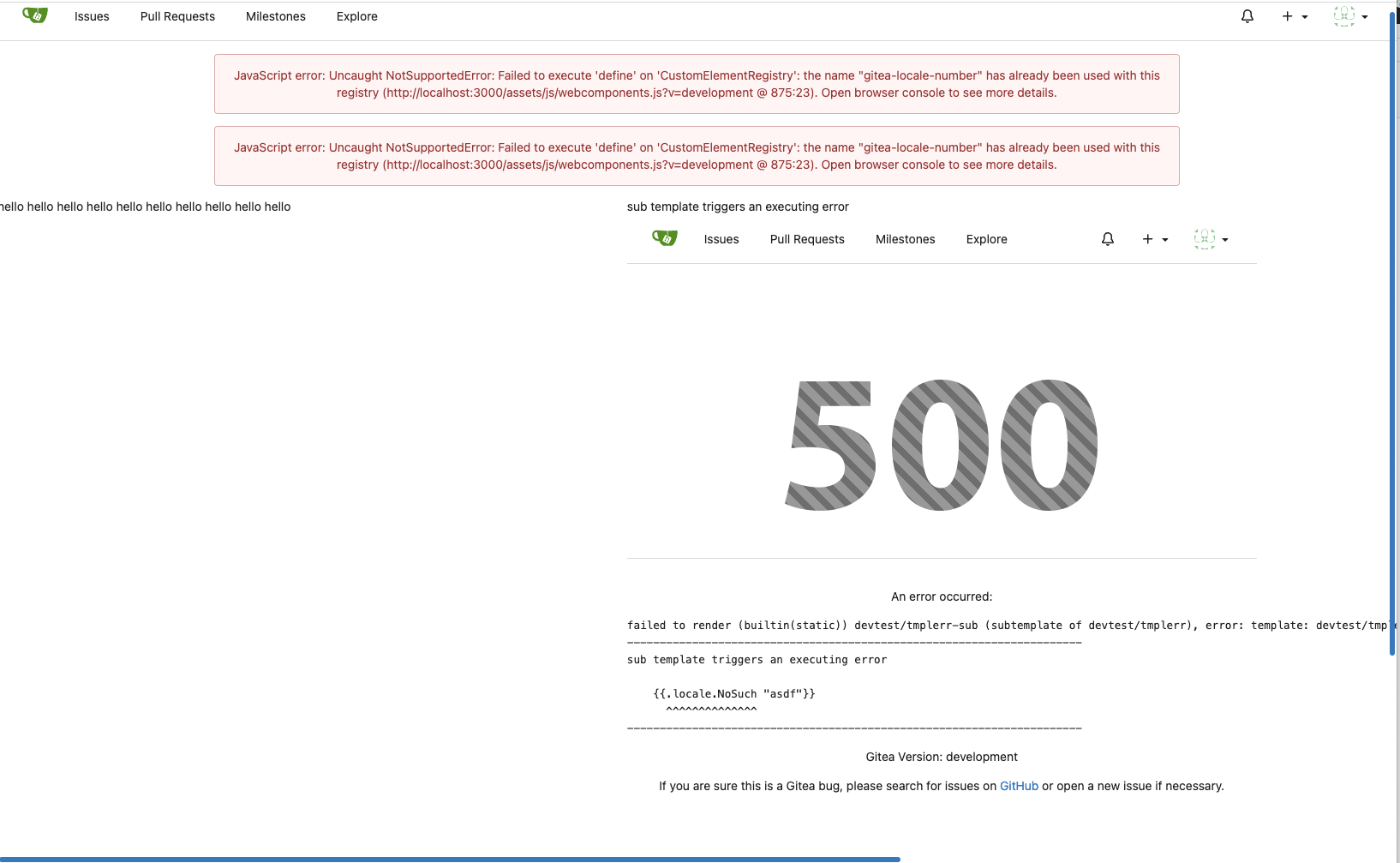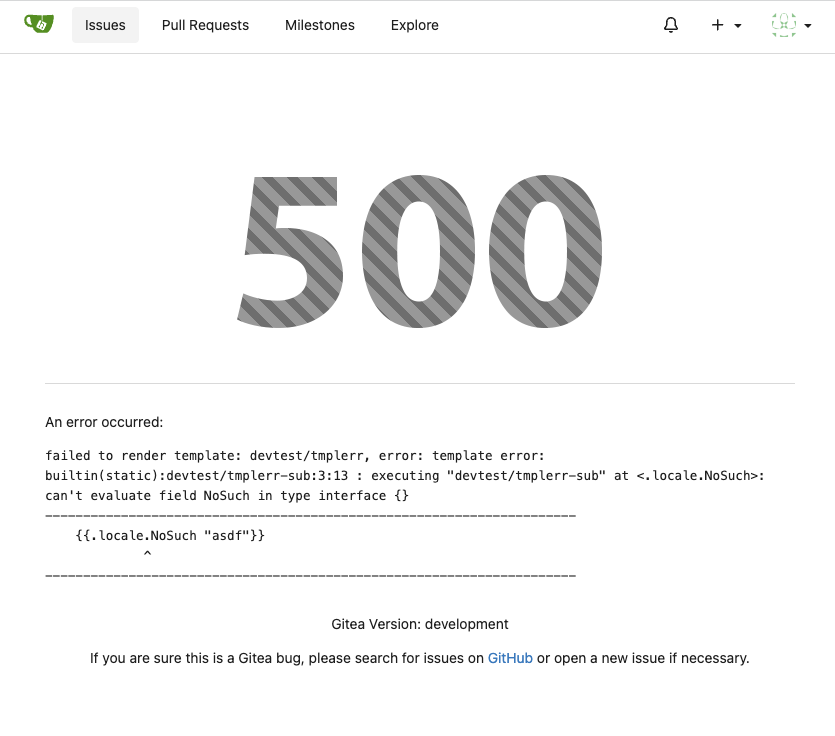| Commit message (Collapse) | Author | Age | Files | Lines |
|---|
| |
|
|
|
|
|
|
|
|
| |
1. non-dev mode is treated as prod mode, to protect users from
accidentally running in dev mode if there is a typo in this value.
2. in dev mode, do not need to really exit if there are template errors,
because the template errors could be fixed by developer soon and the
templates get reloaded, help:
* https://github.com/go-gitea/gitea/issues/24845#issuecomment-1557615382
3. Fine tune the mail template loading message.
|
| |
|
|
|
| |
This can be useful to update custom templates in production mode, when
they are updated frequently and a full Gitea restart each time is
disruptive.
|
| |
|
|
|
|
|
|
|
|
|
|
|
|
|
|
|
|
|
|
|
|
|
|
|
|
|
|
|
|
|
|
|
|
|
|
|
|
|
|
|
|
|
|
|
|
|
|
|
|
|
|
|
|
|
|
|
|
|
|
|
|
|
|
|
|
|
|
|
|
|
|
|
|
|
|
|
|
|
|
|
|
|
|
|
| |
## ⚠️ Breaking
The `log.<mode>.<logger>` style config has been dropped. If you used it,
please check the new config manual & app.example.ini to make your
instance output logs as expected.
Although many legacy options still work, it's encouraged to upgrade to
the new options.
The SMTP logger is deleted because SMTP is not suitable to collect logs.
If you have manually configured Gitea log options, please confirm the
logger system works as expected after upgrading.
## Description
Close #12082 and maybe more log-related issues, resolve some related
FIXMEs in old code (which seems unfixable before)
Just like rewriting queue #24505 : make code maintainable, clear legacy
bugs, and add the ability to support more writers (eg: JSON, structured
log)
There is a new document (with examples): `logging-config.en-us.md`
This PR is safer than the queue rewriting, because it's just for
logging, it won't break other logic.
## The old problems
The logging system is quite old and difficult to maintain:
* Unclear concepts: Logger, NamedLogger, MultiChannelledLogger,
SubLogger, EventLogger, WriterLogger etc
* Some code is diffuclt to konw whether it is right:
`log.DelNamedLogger("console")` vs `log.DelNamedLogger(log.DEFAULT)` vs
`log.DelLogger("console")`
* The old system heavily depends on ini config system, it's difficult to
create new logger for different purpose, and it's very fragile.
* The "color" trick is difficult to use and read, many colors are
unnecessary, and in the future structured log could help
* It's difficult to add other log formats, eg: JSON format
* The log outputer doesn't have full control of its goroutine, it's
difficult to make outputer have advanced behaviors
* The logs could be lost in some cases: eg: no Fatal error when using
CLI.
* Config options are passed by JSON, which is quite fragile.
* INI package makes the KEY in `[log]` section visible in `[log.sub1]`
and `[log.sub1.subA]`, this behavior is quite fragile and would cause
more unclear problems, and there is no strong requirement to support
`log.<mode>.<logger>` syntax.
## The new design
See `logger.go` for documents.
## Screenshot
<details>



</details>
## TODO
* [x] add some new tests
* [x] fix some tests
* [x] test some sub-commands (manually ....)
---------
Co-authored-by: Jason Song <i@wolfogre.com>
Co-authored-by: delvh <dev.lh@web.de>
Co-authored-by: Giteabot <teabot@gitea.io>
|
| |
|
|
|
|
|
|
|
|
|
|
|
|
| |
The old `HTMLRender` is not ideal.
1. It shouldn't be initialized multiple times, it consumes a lot of
memory and is slow.
2. It shouldn't depend on short-lived requests, the `WatchLocalChanges`
needs a long-running context.
3. It doesn't make sense to use FuncsMap slice.
HTMLRender was designed to only work for GItea's specialized 400+
templates, so it's good to make it a global shared instance.
|
| |
|
|
|
|
|
|
|
|
|
|
|
|
|
|
|
|
|
|
|
|
|
|
|
|
|
|
|
|
|
|
|
|
|
|
|
|
|
|
|
|
|
|
|
|
|
|
|
|
|
|
|
|
|
|
|
|
|
|
|
|
|
|
|
|
|
|
|
|
|
|
|
|
|
|
| |
# Background
Golang template is not friendly for large projects, and Golang template
team is quite slow, related:
* `https://github.com/golang/go/issues/54450`
Without upstream support, we can also have our solution to make HTML
template functions support context.
It helps a lot, the above Golang template issue `#54450` explains a lot:
1. It makes `{{Locale.Tr}}` could be used in any template, without
passing unclear `(dict "root" . )` anymore.
2. More and more functions need `context`, like `avatar`, etc, we do not
need to do `(dict "Context" $.Context)` anymore.
3. Many request-related functions could be shared by parent&children
templates, like "user setting" / "system setting"
See the test `TestScopedTemplateSetFuncMap`, one template set, two
`Execute` calls with different `CtxFunc`.
# The Solution
Instead of waiting for upstream, this PR re-uses the escaped HTML
template trees, use `AddParseTree` to add related templates/trees to a
new template instance, then the new template instance can have its own
FuncMap , the function calls in the template trees will always use the
new template's FuncMap.
`template.New` / `template.AddParseTree` / `adding-FuncMap` are all
quite fast, so the performance is not affected.
The details:
1. Make a new `html/template/Template` for `all` templates
2. Add template code to the `all` template
3. Freeze the `all` template, reset its exec func map, it shouldn't
execute any template.
4. When a router wants to render a template by its `name`
1. Find the `name` in `all`
2. Find all its related sub templates
3. Escape all related templates (just like what the html template
package does)
4. Add the escaped parse-trees of related templates into a new (scoped)
`text/template/Template`
5. Add context-related func map into the new (scoped) text template
6. Execute the new (scoped) text template
7. To improve performance, the escaped templates are cached to `template
sets`
# FAQ
## There is a `unsafe` call, is this PR unsafe?
This PR is safe. Golang has strict language definition, it's safe to do
so: https://pkg.go.dev/unsafe#Pointer (1) Conversion of a *T1 to Pointer
to *T2
## What if Golang template supports such feature in the future?
The public structs/interfaces/functions introduced by this PR is quite
simple, the code of `HTMLRender` is not changed too much. It's very easy
to switch to the official mechanism if there would be one.
## Does this PR change the template execution behavior?
No, see the tests (welcome to design more tests if it's necessary)
---------
Co-authored-by: silverwind <me@silverwind.io>
Co-authored-by: Jason Song <i@wolfogre.com>
Co-authored-by: Giteabot <teabot@gitea.io>
|
| |
|
|
|
|
|
|
|
|
|
|
|
|
|
|
|
|
|
|
|
|
| |
Close #24104
This also introduces many tests to cover many complex error handling
functions.
### Before
The details are never shown in production.
<details>

</details>
### After
The details could be shown to site admin users. It is safe.

|
| |
|
|
|
|
|
|
|
|
|
|
|
|
|
|
|
|
|
| |
The idea is to use a Layered Asset File-system (modules/assetfs/layered.go)
For example: when there are 2 layers: "custom", "builtin", when access
to asset "my/page.tmpl", the Layered Asset File-system will first try to
use "custom" assets, if not found, then use "builtin" assets.
This approach will hugely simplify a lot of code, make them testable.
Other changes:
* Simplify the AssetsHandlerFunc code
* Simplify the `gitea embedded` sub-command code
---------
Co-authored-by: Jason Song <i@wolfogre.com>
Co-authored-by: Lunny Xiao <xiaolunwen@gmail.com>
|
| |
|
|
|
|
|
|
|
|
|
|
|
|
|
|
| |
Close #24002
Two problems before:
1. The `log.Fatal` is missing after these `wrapFatal` calls, so the
error is not shown to users.
2. `GetTemplateAssetNames` has different behaviors for local files and
builtin assets, for builtin assets, it also returns directories, so we
need to check the extension again.
I have tested with `TAGS="bindata sqlite sqlite_unlock_notify" make
build && ./gitea` , it works well now. Before, the server responds
internal server error (because it doesn't complete the template parsing)
|
| |
|
|
|
|
|
|
|
|
|
|
|
|
|
|
|
|
|
|
|
|
|
|
|
|
|
|
|
|
|
|
| |
messages (#23982)
Follow #23328
Major changes:
* Group the function in `templates/help.go` by their purposes. It could
make future work easier.
* Remove the `Printf` helper function, there is already a builtin
`printf`.
* Remove `DiffStatsWidth`, replace with `Eval` in template
* Rename the `NewTextFuncMap` to `mailSubjectTextFuncMap`, it's for
subject text template only, no need to make it support HTML functions.
----
And fine tune template error messages, to make it more friendly to
developers and users.


---------
Co-authored-by: silverwind <me@silverwind.io>
|
| |
|
|
|
|
|
|
|
|
|
|
| |
None of the features of `unrolled/render` package is used.
The Golang builtin "html/template" just works well. Then we can improve
our HTML render to resolve the "$.root.locale.Tr" problem as much as
possible.
Next step: we can have a template render pool (by Clone), then we can
inject global functions with dynamic context to every `Execute` calls.
Then we can use `{{Locale.Tr ....}}` directly in all templates , no need
to pass the `$.root.locale` again and again.
|
| |
|
|
|
|
|
|
|
|
|
|
|
|
|
|
|
| |
There are multiple duplicate reports of errors during template rendering
due to broken custom templates.
Unfortunately the error returned here is somewhat difficult for users to
understand and it doesn't return the context of the error.
This PR attempts to parse the error returned by the template renderer to
add in some further context including the filename of the template AND
the preceding lines within that template file.
Ref #23274
---------
Signed-off-by: Andrew Thornton <art27@cantab.net>
|
| |
|
|
|
|
|
|
|
| |
recovery when the error fixed (#22261)
A drawback is the previous generated template has been cached, so you
cannot get error in the UI but only from log
Co-authored-by: KN4CK3R <admin@oldschoolhack.me>
Co-authored-by: delvh <dev.lh@web.de>
|
| |
|
|
|
|
|
|
|
| |
Change all license headers to comply with REUSE specification.
Fix #16132
Co-authored-by: flynnnnnnnnnn <flynnnnnnnnnn@github>
Co-authored-by: John Olheiser <john.olheiser@gmail.com>
|
| |
|
|
|
|
|
|
|
|
|
| |
There are repeated issues reported whereby users are unable to interpret
the template errors. This PR adds some (somewhat complex) error handling
to the panic recovery for template renderering but hopefully makes the
interpretation of the error easier.
Reference #21344
Signed-off-by: Andrew Thornton <art27@cantab.net>
|
|
|
The recovery, API, Web and package frameworks all create their own HTML
Renderers. This increases the memory requirements of Gitea
unnecessarily with duplicate templates being kept in memory.
Further the reloading framework in dev mode for these involves locking
and recompiling all of the templates on each load. This will potentially
hide concurrency issues and it is inefficient.
This PR stores the templates renderer in the context and stores this
context in the NormalRoutes, it then creates a fsnotify.Watcher
framework to watch files.
The watching framework is then extended to the mailer templates which
were previously not being reloaded in dev.
Then the locales are simplified to a similar structure.
Fix #20210
Fix #20211
Fix #20217
Signed-off-by: Andrew Thornton <art27@cantab.net>
|
